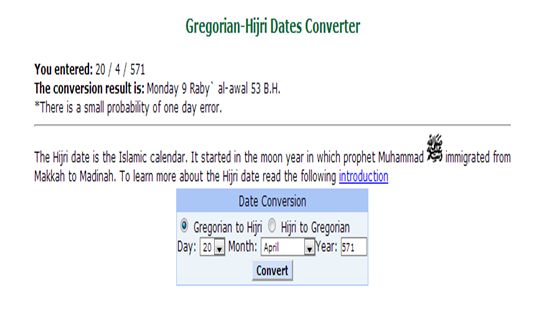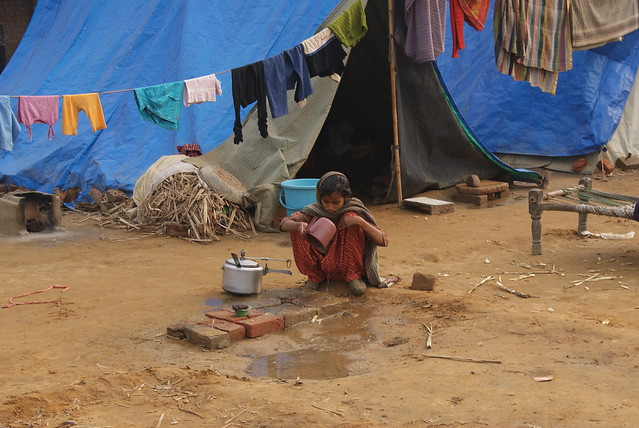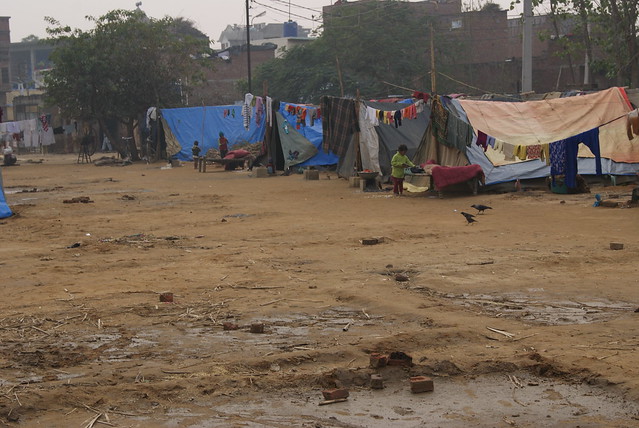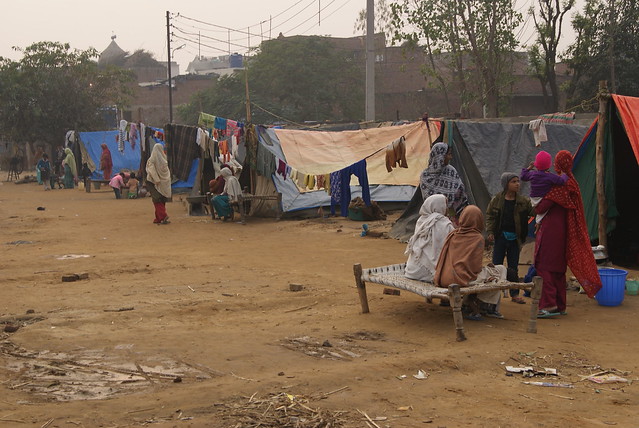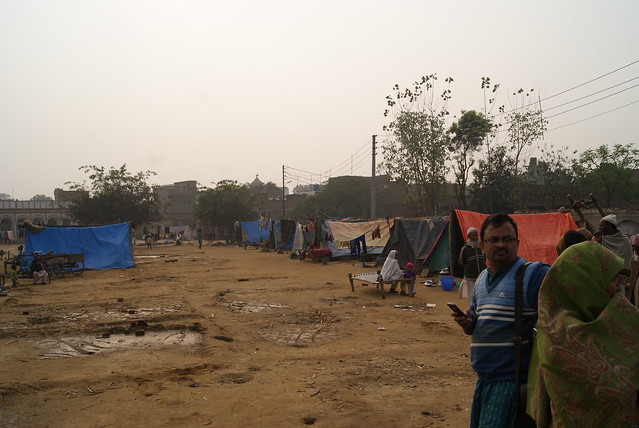By Imaad Majeed,
Having grown up in Mannar, Ramsia was married in 1984 to her husband in Jaffna. “There were no problems before that time,” she said. Her husband worked at the post office. “The whole area around our house was occupied by Muslims. We were happy then because our relatives surrounded us. Now, they have sold off their land and moved away,” Ramsia said. Sonakateru and Moor Street were inhabited entirely by Muslims.
“In 1979, the problems started. The IPKF came in 1987 and caused even more problems. Our house was shelled. Three years after their arrival, we were forced to leave by the LTTE,” she said.
![]()
After the morning prayers one fateful day in October 1990, an announcement was made at Anchi Sandhi asking the men of the households to assemble at the public grounds next to the Osmaniya College. “All the men of the community attended the meeting. We did not know why the men had been summoned. There was no prior warning. When they returned they told us that the ‘Leader’ had ordered an exodus,” Ramsia recalled.
When they were ordered to leave, the men resisted, Ramsia was told. “The men were told that if they did not leave, they would be slaughtered. The men asked for time, but they were only given two hours. Some families left with just 500 rupees in hand. The Tigers (LTTE) searched our vehicles, confiscated whatever valuables were inside, forced people out of their own vehicles and into the vehicles the ‘Leader’ had provided,” she recounted.
The exodus
“No one wished to leave their homes. We were given two hours to vacate the area, and, so, we had no choice but to do so. We could not take our belongings or valuables along with us, and we had no documents at hand. The LTTE made us board their vehicles, as children were screaming and their mothers were in tears. My daughter was traumatized by the incident and cannot speak to this day.
“We were not able to assemble before that to take precautions, as the conflict of the time made it unsafe to gather as we normally would,” she said.
![]()
M H M Faizal.
“When we arrived at Poondoththam in Vavuniya, we were not familiar with the area and could not even find clean drinking water. We spent three days there, and were fortunate enough to be looked after by the people of the area. Those who could not find water, food or shelter, died within those three days. The survivors soon moved towards Puttalam, where we would spend the next 10 years rebuilding our lives,” Ramsia remembered.
Zahira College in Puttalam provided shelter to the refugees for eight days, after which they constructed huts in Kekirawa. “We received dry rations from the Government every 15 days. The late M H M Ashraff went out of his way to see to our needs, but, since his death, we have been neglected. Even after returning to Jaffna in 2002, we only received a sum of 3,000 rupees from the Ministry of Resettlement, even though they were supposed to allocate 25,000 rupees to any resettler. We have next to nothing, and we expect the Government to give us what we deserve,” she said.
When the A9 road was opened in 2002, the Muslim IDPs who were settled in Puttalam began returning to their homes in the North. “I received a letter from Jaffna in which a Tamil man told us that he was living in our home, and informed us that it was safe for us to return.”
“There were many businessmen who sold jewellery in our area before the exodus, but they have all fled. Some of them have continued their businesses in Colombo. This area used to be entirely populated by Muslims, but now there are Hindus living here as well. Our relationship with the Tamil community is still good, and we do not hold any grudges. Some of our own people sold off their lands for such cheap rates and that is worrying because our land is undervalued. It was only after the end of conflict that our people began to rebuild their shops and startup their businesses again,” Ramsia noted.
![]()
Rameez
“We supported the Government at the Northern Provincial Council elections as there was a Muslim contestant who asked for our votes. We did not feel that the TNA does not care for us when they did not ask for our votes. Maybe the TNA thought that we might be holding a grudge against them. If such an election was held in the heyday of our community, back in 1984, we would have had a Muslim representative for this province.
“There is a Madrasa for our community and the Osmaniya School is operational once again,” Ramsia said, and this gives her a sense of comfort. The women of the community come together for bhayan in the evenings which are hosted by a suitable family.
According to the Chief Trustee of the Grand Mohideen Masjid Meeralebbe Lafir, the sermons at the Friday Jummah gatherings are focused on good practice in business. “The Imams will advise us not to cheat other communities and not disturb them as we go about our religious ceremonies and traditions during Ramadan. Once, Wigneswaran visited one of the mosques and assured us that we share the same rights as every other citizen of Jaffna,” Ramsia said.
![]()
Ramsia
Mini Saudi
“Those days, before the exodus, this area was known as ‘Mini Saudi’ because the Muslims of the area were very popular among the community. We owned many of the buildings within the town and conducted our business there. There were jewellers, tailors, suppliers of iron and even transport services, and our clientele was not restricted to Muslims, but included the Tamil community as well,” Lafir said.
There were 14 mosques operating in Jaffna at the time, according to Lafir, and the call to prayer could be heard wherever a Muslim community was present. Before the exodus, Friday Jummah prayers would be conducted at three mosques simultaneously, whereas today, there are only two Jummah prayers conducted, alternating among the mosques in each area. However, according to Lafir, the Jaffna Muslims of today are a different people to those of yesteryear, both in numbers and in character.
“There used to be 15,000 Muslims in Jaffna, and now there are not even 200 families. Many have not returned as their lives are rooted in Puttalam. They may have once believed that peace could be attained, but, after years of conflict, they lost hope and sold off their lands for the lowest bid. Those who could not secure land in Puttalam returned to Jaffna, and these re-settlers are facing hardship every day.”
![]()
The youth
A month prior to the exodus of October 1990, Lafir had taken his family to Kandy as there was no electricity in Jaffna. “We did not intend to move out. We had every intention of returning.” However, fate had different plans for his family. Lafir learnt about the exodus while he was away.
“I handed over the responsibility of my business to my workers when I left. There were no restrictions on what I could take with me, but I did not know that I would not be able to return, so all I took with me were supplies to last a month.”
Lafir had no choice but to accept the situation he was in, and, so, started a business in Mawanella where he would resell products purchased in Colombo. He returned to Jaffna in 2002 but did not take back his business as the Army was occupying his property. Following the end of conflict, the Army vacated the area and he was able to resume his business operations. Today, he runs a boutique by the name of “Pillaws House” where he serves food and beverages. His three children are settled in Mawanella. “They are married now and will not return to Jaffna.”
He is optimistic about the future of relations between the Muslim and Tamil communities. “We invite Tamil people to our festivities and attend those of the Tamil community. When a mosque is being built, we employ the help of their community and, likewise, lend a hand to the Tamils when there is a kovil being constructed.”
![]()
Grand Mohideen Masjid Meeralebbe Lafir.
Skeleton of a home
A few kilometers away from Anchi Sandhi, lives a community of Muslim re-settlers that reside in the vicinity of New Moor Street in Bommaveli. Aboobucker Masjid is the only mosque in the area and has survived since 1971. Each family owns 7.5 perches of land that has been in their possession prior to the exodus of October 1990. Today, the community consists of 188 families.
“We used to live comfortably,” said Rameez, a butcher who runs a meat shop at Anchi Sandhi. “This entire area was a Muslim community, and the half-ruined houses you see now were once two-story buildings. By the time we returned from Puttalam, our homes had been desecrated and we could not even recognize them. The Tigers had taken away the doors, the windows, the roofs and even the bricks off the walls. We were left with nothing but a skeleton of a house,” he said.
The community at New Moor Street does not have a fixed water supply, and only receives water for half an hour in the morning and in the evening for which they pay 60 rupees per month. There are two taps for five families, and no proper sanitation facilities. “There are holes in our roofs, and when it rains it is better to be outside,” said M H M Faizal, a resident of New Moor Street.
![]()
Orphans of policy
Faizal said he trusts the Government will protect them. “We voted for a Muslim candidate but he did not win a seat at the Provincial Council. We need the Government to step in and provide solutions. The IDPs in Kilinochchi have received homes provided by the Indian Housing Scheme, but nothing of that nature has been provided to us. We were IDPs long before them. Now, we are the orphans of policy,” he noted.
Faizal claimed that, despite having all the documentation necessary to apply for a house in a government scheme, his request has not been followed up.
In 2011, the Law and Society Trust published the Report of the Citizens Commission on the Expulsion of Muslims from the Northern Province by the LTTE in October 1990. The report had made recommendations to the Government, which the subsequent Lessons Learnt and Reconciliation Commission drew from. In 2009 and 2010, members of the Citizens Commission visited the Northern peninsula to assess the ground situation of the Muslim community.
Justice U L Abdul Majeed, a retired High Court Judge who had previously served at the Bar in Mannar, was among the nine Commissioners. “The biggest concern among the people who we met at the time was returning to their own land,” Justice Majeed said.
“We recommended some actions in the report, such as the government amend the Prescription Ordinance which allows a person who is forcibly, or by some act, in possession of land that belongs to someone else, for more than 10 years, to claim rights to that land. This is exempt in some cases where the owners may be residing abroad, or of deformed mind (Section 13 of the Prescription Ordinance), but we must include those who were, for reasons beyond their control, unable to return to their land,” he added.
According to Justice Abdul Majeed, the Citizens Commission had also suggested amendments to the Law Commission to suit the conditions of the Muslim IDPs.
Protracted situation
While the statistics on resettlement, provided by the Ministry of Resettlement, have been regarded with cynical skepticism, the language of the “Framework for Resettlement Policy” – available on the Ministry’s website – makes it clear that internally displaced persons are not discriminated against on the basis of ethnicity. “There is no difference among IDPs, whatever community they belong to,” Assistant Secretary to the Ministry, M M Niyamudeen said, “The issues are different according to period of displacement and resettlement. In the case of the Muslim IDPs, they are in a protracted situation.”
On the distinction of protracted situations, the policy states, “Special efforts should be made to ensure the full participation of internally displaced and returnee refugee persons in the planning and management of their return or resettlement and reintegration.” However, when The Sunday Leader spoke to Muslim communities in Jaffna, they were not aware of the Ministry’s efforts towards alleviating their plight.
Addressing this concern, Niyamudeen asserted, “It is the Divisional Secretaries and Government Agents – under the supervision of the Presidential Task Force for Resettlement, Development and Security in the Northern Province – that are involved in facilitating these processes and communicating the efforts to the people”.
The Ministry further stated that at a meeting held recently between the Jaffna Government Aagent and Divisional Secretaries, the Divisional Secretary of Jaffna had stated that there are 1,998 Muslim families currently registered for resettlement, although, physically, only 159 Muslim families are currently living in Jaffna. “Requirements for temporary shelters were discussed, and we are, very positively, looking into these needs. The Muslim families will be included in the third round of the Indian Housing Project,” the Ministry added.
Last week, on January 3, a meeting was held at the Jaffna Government Agent’s office, at which the release of land occupied by the Army in the Akkarai village in the Kopai Division was discussed. Eelam People’s Democratic Party MP Murugesu Chandrakumar and Spokesman M Stalin were present at the meeting. Minister of Resettlement Gunaratne Weerakoon visited the Kopai Divisional Secretariat and provided building materials worth one million rupees to 48 families in the Akkarai village,” the Ministry of Resettlement stated.
When The Sunday Leader contacted the Ministry, Media Secretary I D Maithripala divulged that the Ministry intends to release land at the KKS Cement factory to IPDs who are residing in temporary camps. “The Jaffna Government Agent will coordinate this effort,” Maithripala said.
--
This piece first published in The Sunday Leader.









